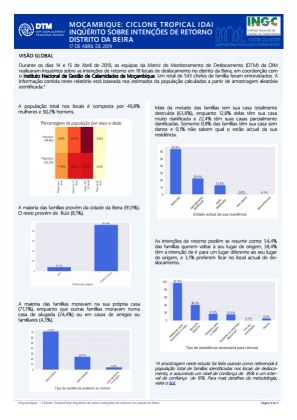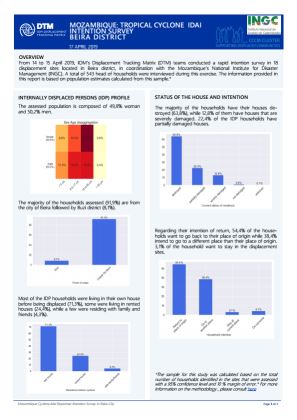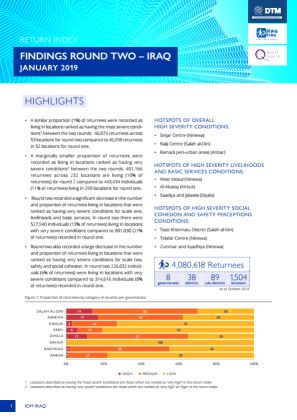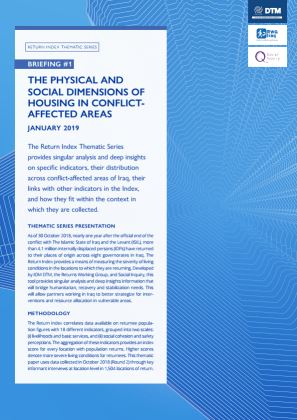-
Countries
-
Data and Analysis
-
Special Focus
-
Crisis Responses
Return Intention

Contact
DTM Iraq, IraqDTM@iom.int
Language
English
Location
Iraq
Period Covered
Jan 01 2019
Mar 31 2019
Activity
- Survey
- Return Intention
- Mobility Tracking
- Baseline Assessment
Of the assessed returnee population, 11 per cent (472,350 individuals) are living in high severity conditions across 279 locations. Ninewa and Salah al-Din governorates host the highest number of returnees living in these conditions with 213, 372 and 187,812 individuals, respectively. This proportion is relatively similar to the previous rounds published in September and January 2019, which had respectively 11% and 10% of returnees in this category.
The locations of return located in Al-Ba’aj District in Ninewa present the highest severity scores: there are very severe conditions in all of these locations, which host 10,722 returnees followed by Tooz District in Salah al-Din and Sinjar District in Ninewa, which are hosting 28,542 individuals (73%) in eight locations and 43,476 individuals (73%) in 40 locations, respectively.

Contact
DTM Mali, DTMMali@iom.int
Language
English
Location
Mali
Period Covered
Feb 01 2019
Feb 28 2019
Activity
- Survey
- Return Intention
- Flow Monitoring
- Mobility Tracking
- Baseline Assessment
Les opérations de collecte et de mise à jour des données menées dans le cadre du programme DTM montrent une diminution du nombre de personnes déplacées au Mali. Le nombre de PDIs est en effet passé de 123.574 personnes (rapport CMP de janvier 2019) à 84 285 en février 2019 soit une réduction de 39.289 individus. Cette réduction est due, au nord, au retour d’environ 22 031 individus, cela s’explique par les déplacements de courte durée et des retours qui sont observés en général dans les 45 à 90 jours qui suivent le déplacement (les populations déplacées retournant dans leurs zones d’origine dès que la situation redevient calme). Par ailleurs, au niveau du centre, la réduction du nombre de PDIs est due au déplacement secondaire d’environ 23 607 individus de la région de Mopti vers d’autres localités du pays ou vers la Boucle du Mouhoun au Burkina Faso.

Contact
DTM Support, DTMSupport@iom.int
Language
Portuguese
Location
Mozambique
Period Covered
Apr 14 2019
Apr 15 2019
Activity
- Return Intention
Os dias 14 e 15 de Abril, as equipas da DTM, em coordenação com o Instituto Nacional de Gestão de Calamidades de Moçambique (INGC), realizaram inquéritos sobre as intenções de retorno em 18 locais de deslocamento no distrito da Beira.

Contact
DTM Support, DTMSupport@iom.int
Language
English
Location
Mozambique
Period Covered
Apr 14 2019
Apr 15 2019
Activity
- Return Intention
From 14 — 15 April, DTM teams in coordination with Mozambique’s National Institute of Disaster Management (INGC), conducted a rapid intention survey in 18 displacement sites in Beira district.

Contact
DTM Cameroon, DTMCameroon@iom.int
Language
English
Location
Cameroon
Period Covered
Jun 13 2018
Jun 26 2018
Activity
- Survey
- Return Intention
Within the context of the fourteenth round of Displacement Tracking Matrix (DTM) assessments in the Far North Region of Cameroon, a Return Intention Survey (RIS) was conducted with IDPs, Out of Camp Refugees and Returnees. The survey took place between 13-26 June 2018 in 786 locations amidst the region's six department. 4,064 households were interviewed in the course of the survey. 74% of IDPs and Out of Camp Refugees indicated they did not wish to leave their current location, while 22% wished to return to their location of origin and 4% expressed the wish to leave for a different location. The primary reasons for which IDPs and Refugees indicated the wish to return were the search for livelihood opportunities (51%) and the lack of access to basic serviced in the displacement location (49%).

Contact
DTM Cameroon, DTMCameroon@iom.int
Language
English
Location
Cameroon
Period Covered
Nov 13 2018
Nov 23 2018
Activity
- Survey
- Return Intention
Within the context of the sixteenth round of Displacement Tracking Matrix (DTM) assessments in the Far North Region of Cameroon, a Return Intention Survey (RIS) was conducted with IDPs, Out of Camp Refugees and Returnees. The survey took place between 13-23 November 2018 in 558 locations amidst the region's six department. 3,038 households were interviewed in the course of the survey. 74% of IDPs and Out of Camp Refugees indicated they did not wish to leave their current location, while 23% wished to return to their location of origin and 3% expressed the wish to leave for a different location. Surveyed households mentioned four primary conditions required for them to return: a guarantee of the presence of security forces in the area of origin (71%); provision of humanitarian assistance in the location of origin (30%); improved access to basic services (31%); and the rehabilitation of damaged homes (27%).

Contact
DTM Iraq, IraqDTM@iom.int
Language
English
Location
Iraq
Period Covered
Jul 01 2018
Sep 30 2018
Activity
- Survey
- Return Intention
- Mobility Tracking
- Baseline Assessment
As more people return to their places of origin than remain displaced in Iraq, it is necessary to know the severity of conditions in the locations to which they are returning, how this changes over time, and finally, which locations have limited returns and why, to shape strategies for intervention and resource allocation. The new Return Index is a tool developed to measure this in over 1,400 return locations in the country. This briefing report highlights the tool, its methods, initial findings, and uses of data.

Contact
DTM Iraq, IraqDTM@iom.int
Language
English
Location
Iraq
Period Covered
Oct 01 2018
Jan 31 2019
Activity
- Survey
- Return Intention
- Mobility Tracking
- Baseline Assessment
A similar proportion (1%) of returnees were recorded as living in locations ranked as having the most severe conditions1 between the two rounds: 46,074 returnees across 53 locations for round two compared to 46,998 returnees in 52 locations for round one. A marginally smaller proportion of returnees were recorded as living in locations ranked as having very severe conditions2 between the two rounds: 401,166 returnees across 232 locations are living (10% of returnees) for round 2 compared to 443,434 individuals (11% of returnees) living in 290 locations for round one. Round two recorded a significant decrease in the number and proportion of returnees living in locations that were ranked as having very severe conditions for scale one, livelihoods and basic services. In round two there were 527,940 individuals (13% of returnees) living in locations with very severe conditions compared to 801,030 (21% of returnees) recorded in round one. Round two also recorded a large decrease in the number and proportion of returnees living in locations that were ranked as having very severe conditions for scale two, safety and social cohesion. In round two 226,032 individuals (6% of returnees) were living in locations with very severe conditions compared to 314,616 individuals (8% of returnees) recorded in round one.

Contact
DTM Iraq, IraqDTM@iom.int
Language
English
Location
Iraq
Period Covered
Oct 01 2018
Jan 31 2019
Activity
- Survey
- Return Intention
- Mobility Tracking
- Baseline Assessment
As of 30 October 2018, nearly one year after the official end of the conflict with The Islamic State of Iraq and the Levant (ISIL), more than 4.1 million internally displaced persons (IDPs) have returned to their places of origin across eight governorates in Iraq. The Return Index provides a means of measuring the severity of living conditions in the locations to which they are returning. Developed by IOM DTM, the Returns Working Group, and Social Inquiry, this tool provides singular analysis and deep insights information that will bridge humanitarian, recovery and stabilization needs. This will allow partners working in Iraq to better strategize for interventions and resource allocation in vulnerable areas.

Contact
DTM Cameroun, DTMCameroon@iom.int
Language
French
Location
Cameroon
Period Covered
Nov 12 2018
Nov 23 2018
Activity
- Survey
- Return Intention
Dans le cadre de sa seizième phase de la Matrice de suivi des déplacements (DTM), l’Organisation Internationale pour les Migrations (OIM) a mené une enquête sur les intentions de retour ciblant les Personnes Deplacées Internes (PDI) et réfugiés hors camp dans la région de l’Extrême-Nord du Cameroun. L’enquête a eu lieu en novembre 2018 dans les six départements de la région: Diamare, Mayo-Danay, Mayo-Kani, Mayo Tsanaga, Mayo-Sava, et Logone-et-Chari. L'enquête a été menée dans 558 localités auprès de 3 038 ménages deplacés. 74% des PDI et réfugiés ne souhaitaient pas quitter le lieu actuel. 23% souhaitent retourner dans leur lieu d’origine et 3% souhaitaient se déplacer ailleurs. Selon les personnes enquêtées, les quatre conditions principales nécessaires au retour, étaient : assurer la présence des forces de sécurité dans la zone d’origine (71%), bénéficier de l’aide internationale dans le village d’origine (30%), l’amélioration de l’accès aux services de base (31%), et la réhabilitation des maisons endommagées (27%).
Pagination
- Previous page
- Page 30
- Next page
